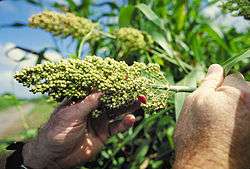Definify.com
Definition 2026
蜀黍
蜀黍
Chinese
| Sichuan | broomcorn millet; glutinous millet | ||
|---|---|---|---|
|
simp. and trad. (蜀黍) |
蜀 | 黍 | |
Noun
蜀黍
Synonyms
- 高粱 (gāoliáng)
Japanese
Etymology 1
| Kanji in this term | |
|---|---|
| 蜀 | 黍 |
| Hyōgaiji | Hyōgaiji |
| Irregular | |
Compound of 唐 (morokoshi, “China in general; (by extension) foreign”) + 黍 (kibi, “millet”).
The spelling is from Chinese.[1] See shokusho below.
Pronunciation
- (Irregular reading)
- (Tokyo) もろこしきび [mòrókóshí kíꜜbì] (Nakadaka - [5])
- IPA(key): [mo̞ɺ̠o̞ko̞ɕi kʲibi]
Alternative forms
Noun
蜀黍 (hiragana もろこしきび, romaji morokoshi kibi)
Usage notes
The longer term morokoshi kibi has been largely replaced by the shorter form morokoshi below.
Synonyms
Etymology 2

| Kanji in this term | |
|---|---|
| 蜀 | 黍 |
| Hyōgaiji | Hyōgaiji |
| Irregular | |
Abbreviation of morokoshi kibi above, with the abbreviated reading then re-applied to the entire kanji compound.[1]
Pronunciation
Alternative forms
Noun
蜀黍 (hiragana もろこし, romaji morokoshi)
- sorghum
- maize, corn (especially corn on the cob)
Synonyms
- (sorghum): 蜀黍 (morokoshi), 唐黍 (morokoshi), 唐黍 (tōkibi), 高黍 (takakibi)
- (maize): 玉蜀黍 (tōmorokoshi), 唐黍 (tōkibi)
Usage notes
The term 玉蜀黍 (tōmorokoshi) is more common for the maize sense.
Etymology 3
| Kanji in this term | |
|---|---|
| 蜀 | 黍 |
|
しょく Hyōgaiji |
しょ Hyōgaiji |
| on'yomi | |
From Middle Chinese compound 蜀黍 (dzyowk syoX, literally “Shu (old place name) + millet”). The ancient state of Shu is roughly analogous to modern Sichuan province.
This reading appears to be rare, and may be obsolete.
Pronunciation
Noun
蜀黍 (hiragana しょくしょ, romaji shokusho)
- (rare, possibly obsolete) sorghum